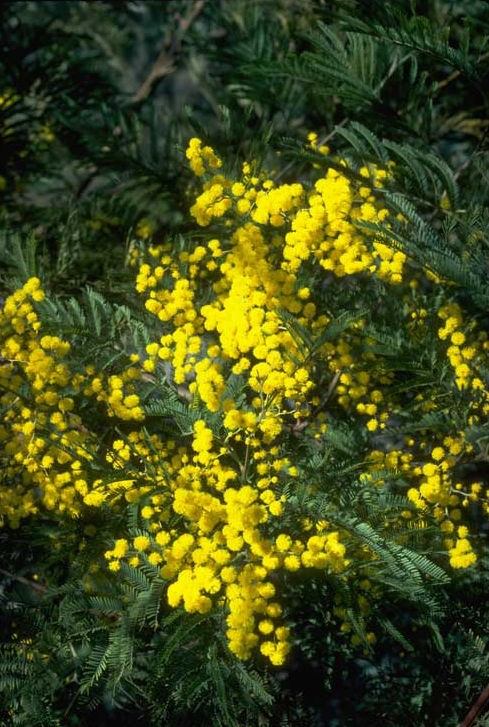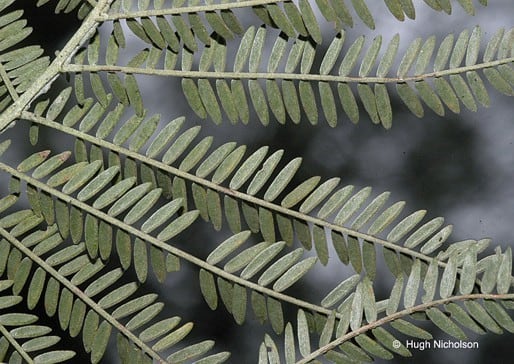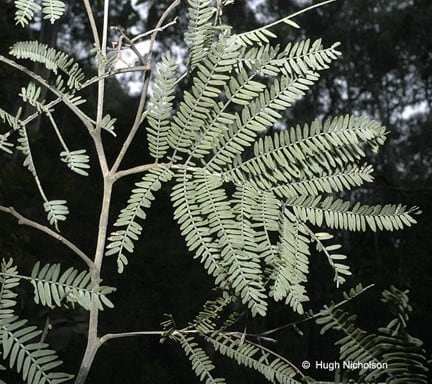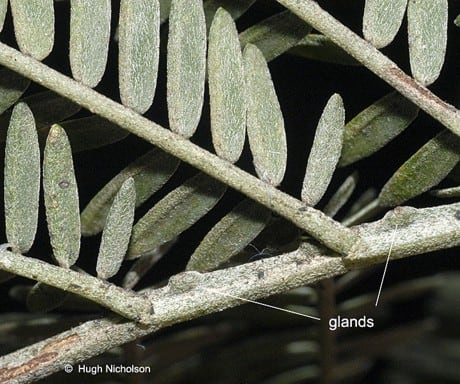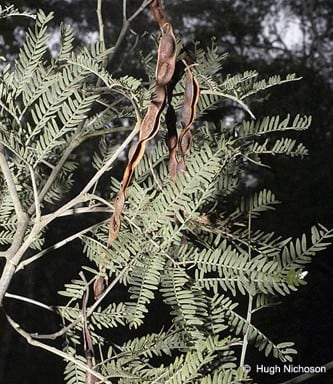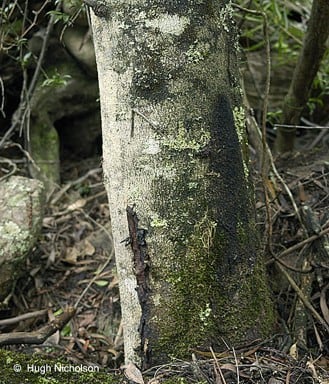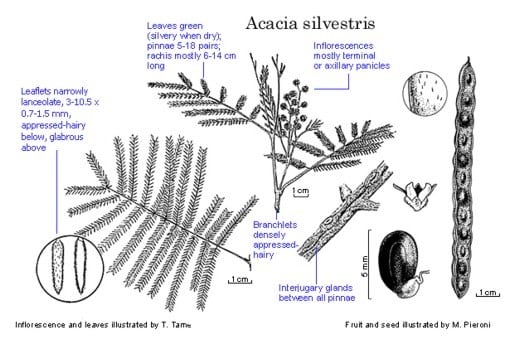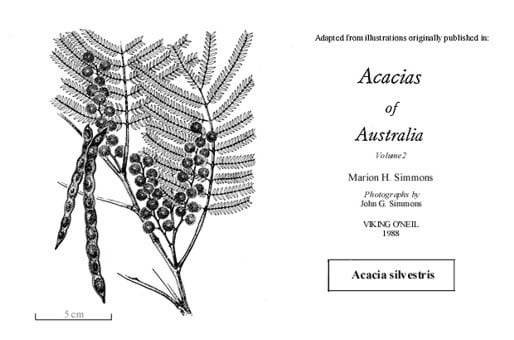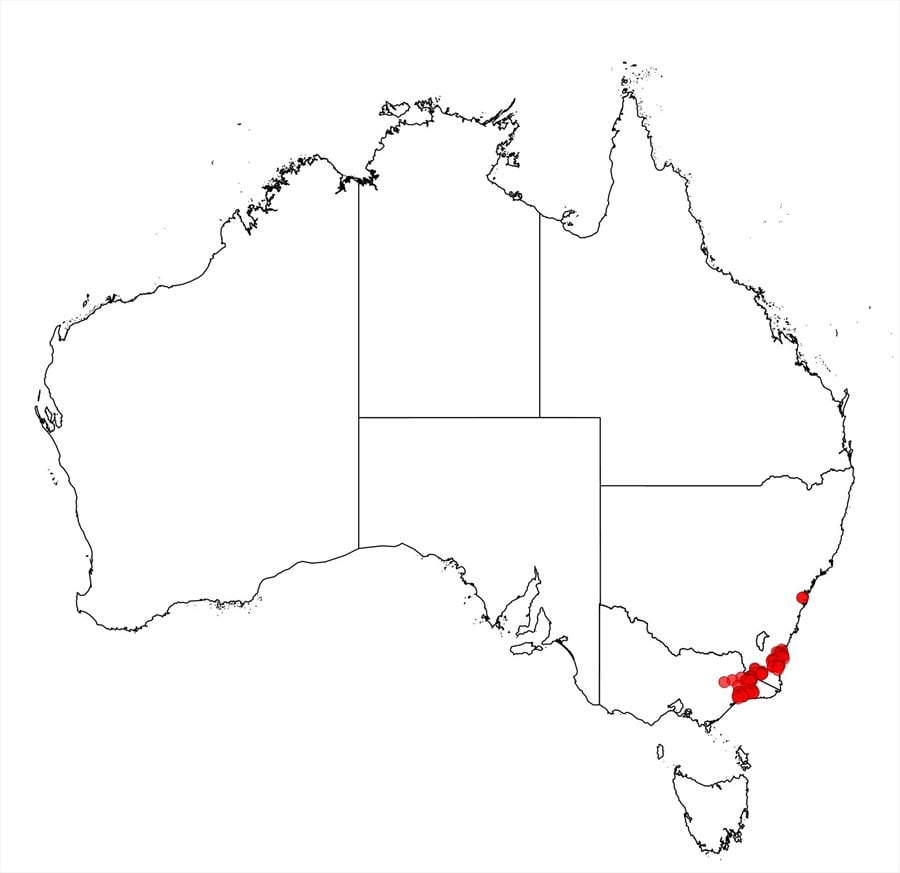Acacia silvestris Tindale
WATTLE
Acacias of Australia
Common Name
Bodalla Silver Wattle, Red Wattle
Family
Fabaceae
Distribution
Occurs in eastern Australia S from Bodalla State Forest, N.S.W., and in the highlands of East Gippsland, Vic.
Description
Spreading tree 6–30 m high; d.b.h. to 1.8 m. Bark smooth, grey, often mottled. Branchlets terete except towards apices, scarcely ridged, densely whitish to grey appressed-puberulous. Young foliage-tips pale to bright yellow, velvety-pubescent. Leaves green when fresh, silvery when dried; petiole above pulvinus 1–3.5 cm long, much flattened vertically, with 1 small gland at base of lowest pinnae, sometimes with 1 or 2 other scattered glands; rachis (3–) 6–14 cm long, usually with 1 or 2 often contiguous hairy glands at base of each pair of pinnae, and with 1–3 interjugary glands between successive pairs of pinnae; pinnae 5–18 pairs, (3–) 4–9.5 cm long; pinnules 17–50 pairs, narrowly lanceolate, 3–10.5 mm long, 0.7–1.5 mm wide, sometimes incurved, darker and ±glabrous above, with white appressed straight hairs beneath, markedly acute. Inflorescences mostly in terminal or axillary false-panicles or rarely in axillary racemes; peduncles 2–7 mm long, appressed-hairy. Heads 18–30-flowered, yellow. Pods variably but mostly only slightly constricted between seeds, 4–15.5 cm long, 6–10 mm wide, coriaceous, smooth, brown to black, bluish over seeds, paler at margins and between seeds, subglabrous.
Phenology
Flowers July–Sept.
Habitat
Often forming extensive forests especially on slate, being most common in open eucalypt forests on rocky hillsides of steep gullies, over the saddle of ridges and on alluvial flats.
Specimens
N.S.W.: c. 8 km SW of Nerrigundah, M.P.Austin 134 (CANB, HBG, K, MEL, MO, NSW); Princes Hwy, 12 miles [19.2 km] N of Bega, R.G.Coveny 2925 (A, AD, CANB, CHR, G, L, LE, MEL, NSW, PERTH, RB, RSA, TNS, U, UC, US); Brogo Pass, 8 Sept. 1960, M.D.Tindale s.n. (NSW). Vic: Snowy R. valley, near Gelantipy–Bonang road, 1 Jan. 1969, K.C.Rogers (MO, NSW, Z); Gattamurh Ck, H.van Rees 44 (MEL, NSW); Snowy R., Deddick–Wulgulmerang road, N.A.Wakefield 2185 (BRI, MEL, NSW).
Notes
Acacia silvestris is sometimes cultivated in parks and large gardens. Regeneration of this long-lived species is almost always after fire. It commonly forms dense pure stands with trunks clear of limbs up to 18.5 m, but scattered trees in open country have short trunks.
Similar to A. dealbata which has smaller pinnules, jugary glands and spreading hairs.
FOA Reference
Data derived from Flora of Australia Volumes 11A (2001), 11B (2001) and 12 (1998), products of ABRS, ©Commonwealth of Australia
Author
M.D.Tindale, P.G.Kodela
Minor edits by J.Reid
This identification key and fact sheets are available as a mobile application:
URL: https://apps.lucidcentral.org/wattle/
© Copyright 2018. All rights reserved.
